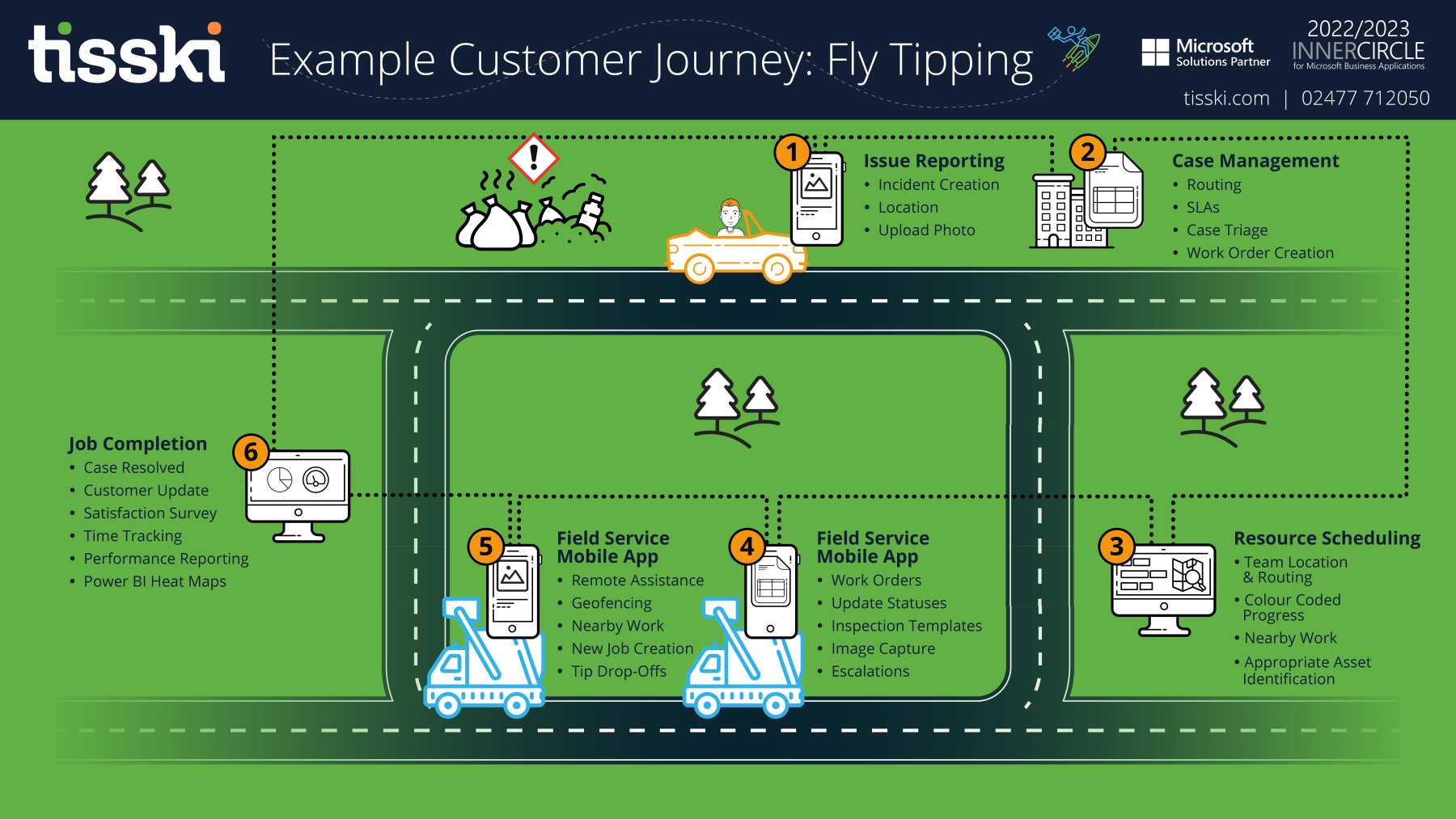The Benefits of Digital Transformation in Government
Like many public sector organisations, the government has made significant changes in the way it interacts with the public over the last decade. From citizen requests and reports to forms and feedback, information that was once captured using pen and paper is now handled by innovative, purposely designed, end-to-end digital solutions.
With tech giants like Microsoft key players in this space, local councils and central government departments can benefit from purpose-built tech solutions that help streamline not only the capture of information, but associated processes, as well.
Self-service portals and online forms can provide the general public with quick and simple ways to provide government organisations with information – and today, these tools are used for a whole host of tasks, from requesting a new driving licence or submitting a self-assessment tax return, through to reporting a missed bin collection.
This digital approach extends to streamline back-end processes, too, with tools like Microsoft Dynamics 365 and the Power Platform here to help enhance automation and electronic data handling to allow for more efficient processing, workflows, and planning.
In 2020, the UK Government outlined some of the key benefits of service transformation – benefits that would impact both citizens and the government itself. For the public, simpler services make it easier to get things done and in a shorter amount of time, while the government sees time and cost savings, a reduced reliance on legacy technology and an increase in the quality of data.
Let’s take the 2017 roll-out of a digitalised passport application process as an example. In a statement given at the time of the launch, then Immigration Minister, Robert Goodwill, said: “This latest offering is a key part of the Home Office’s drive to transform the way we deliver our services through digitisation. It is designed to improve efficiency and convenience by providing a modern and secure service to millions of passport holders and applicants.”
Fast forward six years, and recent HM Passport Office data shows that the Passport Office processed almost 3 million domestic applications in the second quarter of 2022 – quite possibly the largest number of applications ever – all enabled by the new digital system in place.
How is digital transformation benefitting local governments?
While the example of digital transformation above draws on a central government success, digital transformation is happening at a local level, too, across customer service and within back-office processing and operations. Thanks to the adoption of digital technology, local councils have been able to start:
Transforming public services
The public now have more choice of how they interact with local government services, whether it be online, over the phone, or via email. Using a fully integrated digital system means interactions and data from each person collected across all channels are connected, allowing for more efficient information and data handling.
Driving budget value
Automated processes and quicker timescales allow for more effective budget handling. For example, just using the products in the Microsoft suite increases the efficiency of information gathering and request handling. In turn, this helps local councils provide a better service at a lower cost to various departments.
Bettering data for decision-making
By having one integrated system, data collected from every interface – whether it be customer facing or through the back-end – can be amalgamated to form a single view of a customer. Data can be safely and securely handled, allowing local councils to not only react more effectively, but also to identify actionable insights that enable them to be more proactive when it comes to public needs.
Increasing productivity and efficiency
Legacy systems are often siloed, meaning they all operate separately from one another, and data or information collected by one system cannot be shared with another. For local government employees and civil servants, this means inputting the same information into each system. Thanks to modern systems, information and data is shared, increasing efficiency and productivity.
How is digital transformation technology benefitting government customer service?
Government customer service can be split into three remits: contact centres, customer service and customer journey.
The Microsoft suite allows each of these remits to become fully integrated, providing a seamless journey for both the customer and the various internal teams handling back-office operations.
How digital technology is benefitting government contact centres and customer service
By adopting technologies like the Microsoft Digital Contact Center Platform and Dynamics 365 Customer Service, local councils can modernise their customer service by offering multiple channels through which members of the public can get in touch. In addition, users benefit from a highly personalised experience, have access to self-service tools and are quickly connected to the right agent for their needs.
Behind the scenes, government customer service agents have access to a full 360 view of their customers. AI can help them understand customer language and even give conversation prompts based on historic interactions, while automation puts them in touch with the right experts to solve a query. Customer journey analytics help staff to understand how people interact with their customer service software, while sophisticated security features keep customer information secure.
How digital technology is benefitting customer journeys
Thanks to the integrated nature of Microsoft Dynamics technologies and other Microsoft platforms, government organisations can collect data and information from all stages of the customer journey. This allows them to create a single view of a customer and helps them to identify actionable insights that will help to further improve the customer journey.
We explore specifically how Microsoft Dynamics benefits government affiliated housing associations in a separate article. In the article, you can see how the integrated suite of technologies empowers customers at all stages of the customer journey; from simple, contactless issue reporting to case updates, right through to customer service feedback.
Government digital transformation in action
We can see local government digital transformation in action from the way in which Microsoft Dynamics 365 software handles reports of fly tipping. Each stage of the journey – from a member of the public first reporting the case to scheduling the resources to clear the rubbish – is connected, as shown in the diagram below:
When they adopt Microsoft Customer Service software, local councils can transform public services by providing a quick and simple way for members of the public to report incidents of fly tipping. On this public facing interface, the public can receive case updates, and are automatically updated when their report of fly tipping has been actioned and closed, ensuring a smooth customer journey.
Thanks to Field Service software, local councils can drive budget value because actions are triggered automatically based on the information given, allowing for minimal human input throughout the entire operational process. Workers can receive jobs, report progress, and input job information, while behind the scenes, automation takes care of asset management and team location and routing, increasing productivity in areas where human input is genuinely needed.
With multiple software fully integrated together, higher quality data can be collected and harnessed in a way that allows local councils to make decisions and spot trends and actionable insights. Tools like Microsoft Customer Voice allow members of the public to feedback on how their case was handled, giving local councils data they can use to inform customer service improvements.
Tisski is helping government organisations with their digital transformation
Tisski is a Microsoft Solutions Partner, which means we are qualified to deliver sophisticated, tailored Microsoft solutions to customers in government, police and more.
We have a fantastic team of over 150 dedicated employees, including engineers, consultants, and customer service teams who are here to ensure our customers experience our finely tuned approach from initial consultation, right through to ongoing system support.
We work closely with central governmentand local government organisations to understand their unique needs, recommending a Microsoft solution that will transform operations – from front-end customer facing technology to behind-the-scenes automation and processing.
If you would like to revolutionise the way you deliver your service – and save time and resource in the process – please don’t hesitate to get in touch. Call us today to find out more.

Contact Us
Our team is here to help We've guided local councils and helped them deliver important elements of their digital transformation. Find out how we could do the same for you.
We've guided local councils and helped them deliver important elements of their digital transformation. Find out how we could do the same for you.

